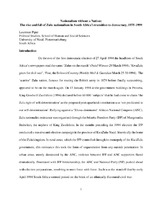| dc.contributor.author | Piper, Laurence | |
| dc.date.accessioned | 2021-02-01T08:27:01Z | |
| dc.date.available | 2021-02-01T08:27:01Z | |
| dc.date.issued | 2003 | |
| dc.identifier.citation | Piper, L. (2003). Nationalism without a nation: The rise and fall of Zulu nationalism in South Africa's transition to democracy, 1975-99.Nations and Nationalism, 8(1), 2-30 | en_US |
| dc.identifier.uri | https://doi.org/10.1111/1469-8219.00039 | |
| dc.identifier.uri | http://hdl.handle.net/10566/5798 | |
| dc.description.abstract | During South Africa’s transition from apartheid to democracy the most virulent opposition to change came from Zulu nationalism. Post‐apartheid, however, Zulu nationalism has largely waned. This is because Zulu nationalism was instrumentally invoked and jettisoned by the Inkatha Freedom Party. Beginning in 1975, Inkatha embraced a ‘third way’ resistance politics between ‘acquiescence’ in apartheid and ‘impossible’ militant resistance. It was only later that Inkatha turned to Zuluness when it was out‐competed by the ANC and allies, first over the leadership of resistance politics and secondly during the transition. After 1994 the inclusion of the IFP in democratic government made old strategies redundant and thus it abandoned Zulu nationalism. Moreover, while a widespread sense of Zuluness exists, the meanings attached to it vary to the extent that the Zulu nation cannot exist. Thus the Zulu nationalism of the transition was an elite‐driven political nationalism prosecuted without a popularly imagined Zulu nation. | en_US |
| dc.language.iso | en | en_US |
| dc.publisher | WILEY | en_US |
| dc.subject | Zulu nationalism | en_US |
| dc.subject | South Africa | en_US |
| dc.subject | Democracy | en_US |
| dc.subject | Inkatha Freedom Party | en_US |
| dc.subject | Post‐apartheid | en_US |
| dc.title | Nationalism without a nation: The rise and fall of Zulu nationalism in South Africa's transition to democracy, 1975-99 | en_US |
| dc.type | Article | en_US |

